Ellen Page was standing in a car park in Brazil as a masked man explained why he murders gay people. It was 2015, and she was filming Gaycation, the documentary series she made with her best friend Ian Daniel after coming out on Valentine’s Day a year earlier. “I’m here today because I am gay and because maybe I can make a difference,” she’d said in a speech at a Human Rights Campaign conference that has since been shared many millions of times. “I suffered for years because I was scared to be out… And I’m standing here today, with all of you, on the other side of all that pain.”
In the car park, the only sign that she’s disturbed by this ex-cop and his promise to kill again is a familiar crinkling between her eyebrows. This is a technique she deployed effectively when explaining why she was going to keep the baby in Juno (for which she received an Academy Award nomination), and talking an abuser through his castration in her breakout role in Hard Candy, and then in Inception, as the world exploded around her. Page shields her mouth from the murderer as she asks her producer whether she’ll be safe if she tells him she’s gay. “I want to,” she says, firmly. So she does.
I arrive at our New York restaurant as evening settles, but the place is empty. “Are you here to meet, uh, Alan?” the waitress beams, walking me to a seemingly unoccupied booth. And there she is, slouched on a banquette, 5ft 1in under four layers of shirt, looking at her phone beneath a wide-brimmed cap. Not an inch of flesh is showing between her knuckles and chin – none of her eight homemade tattoos (including nicknames of her friends Catherine Keener and Kristen Wiig) are visible, and the light is such that her face remains in shadow.

She orders me a tequila cocktail and explains why she chose this restaurant – it’s on the doorstep of her new home – in an apologetic tone. She never thought she’d live somewhere like this fancy apartment block, “but they have a composting system so…” Now 31, she has just moved to the city, in part because she loves to walk, and LA resents walkers, and in part for her wife’s work – Emma Portner, 24 and a dancer, was the youngest woman to choreograph a West End musical. Page first saw her dancing on Instagram; they married soon after.
When our allotted hour is up, Portner will lope into the empty restaurant in an oversized black hoodie, her face barely visible, and slide into the homely crook of Page’s arm – “Hi sweetie” – and Page will relax for the first time. Portner will fold herself on to the seat shyly, rest her head on the table and wait for me to leave, so I will.
Growing up in Nova Scotia, Page got her first acting job at 10, but found uncomfortable fame in 2007 with Juno, an indie film that eventually catapulted her into roles in huge blockbusters such as X-Men and Inception. It had such an impact that when, a year later, 17 students became pregnant at a school in Massachusetts at the same time as Sarah Palin’s 17-year-old daughter, Time magazine called it “the Juno Effect”. At which point, Page decided to disappear. For a while at least.
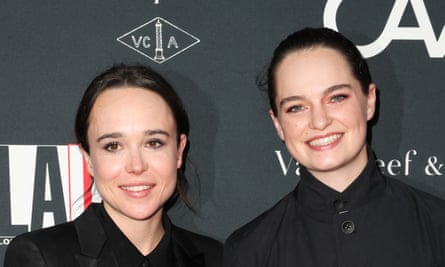
There’s a phrase that makes distinct the difference between going for a drink after work and a plan to throw yourself into a night of parties whatever the absolute hell might happen, and it’s this that I think of when looking at the decisions Page made after an entire career avoiding questions about her sexuality. In 2014 she didn’t just come out, she came “out-out” as if making up for lost time. She appeared at Ted Cruz’s barbecue with a microphone and challenged him through a cloud of pork smoke; on Twitter she mourned the death of nine-year-old Jamel Myles who took his own life as a result of homophobic bullying; her Gaycation series, travelling around the world meeting the most marginalised LGBTQ communities, was more than just a travel show. Like all her interventions since that Valentine’s Day speech, it was a statement of intent. The day before we meet, she posts a tearful photo on her Instagram, marking her first anniversary of marriage to Portner. “Beyond grateful to all those who fought to allow us to be wife & wife.” Her outness is not incidental: it’s pointed and political, and it reads as something between liberation and apology, the apology being for not coming out sooner.
She has just wrapped on Netflix’s new series of Tales of the City, the most recent adaptation of Armistead Maupin’s groundbreaking novels that chart the lives of a group of friends in San Francisco. Maupin first found a mainstream sort of fame upon posthumously outing his friend Rock Hudson, and more than 30 years later he maintains the moral obligation he feels to lift the stigma of homo sexuality by being truthful.
I wonder if Page, out-out as she is today, feels a similar pull? “I have a responsibility to be out now, because I have these resources. I can access therapists and security and support. But the reality is a lot of people can be in severely grave danger. I think, for instance, it would have been very harmful for me if someone had outed me earlier. When I was 20, someone wrote an article with the headline: ‘The Ellen Page Sexuality Sweepstakes’ in the Village Voice. ‘Is Juno a you know?’” it concluded. She shudders, remembering the effect it had on her to have her sexuality debated in the press before she had come to terms with it herself. “I never even touched a woman outside until I was 27. I was very depressed, and very anxious. I was not well.”
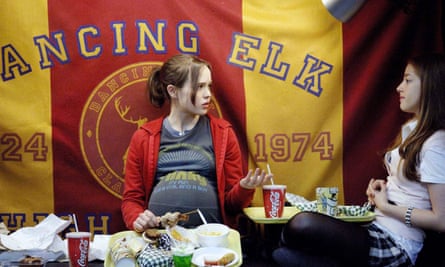
After Juno’s success and the inevitable graduation to red-carpet star (with recurring appearances on FHM’s Sexiest 100 list), she needed to escape. She enrolled on a permaculture course in an eco-village in Oregon where, building giant composts and peeing in buckets, she met Ian Daniel, seemingly the only person in America that year to have no idea who she was. “I know Hollywood can be an overwhelming and toxic system at times,” he emails from India, explaining the “grace” of his friend. “She pushed back to be herself in a place that wanted her to be a more conventional feminine ideal. She wasn’t interested in that. I think she sees that the world needs to see more mainstream representations of the multitude of ways we really are. She risked a lot by coming out when she did, but she had the insight to know she could help make it easier for others in the future – and that she would be happier, too. She’s helped create a new path for LGBTQ people in Hollywood. For someone so small,” he adds, “she has huge force.”
Together they embarked on Gaycation, leading with their own queerness. Page’s public coming out began with the speech, but continued through this exploration of communities. Continues, even. “Filming, I felt sadness and anger, but mixed with the most powerful inspiring moments of absolute joy, and gratitude, to be in the presence not only of activists but individuals who are brave because they are themselves every day.”
Interviewing anti-gay men like Brazil’s president Jair Bolsonaro and a Rastafarian leader in Jamaica, did they feel like they changed any minds? She purses her lips. “There were a couple of moments where you’d see a little spark. But I’m sad to say that that was rare. I want to be like: ‘Yeah, Ted Cruz came over afterwards and we had a longer convo and he gets it now!’ But no, I mean, when you’re talking to the head of a neo-Nazi group in the Ukraine, you’re probably not going to end up hugging. But, you’re at least going to have a conversation and some kind of representation.” She takes a deep breath, resigned. This is her job now.
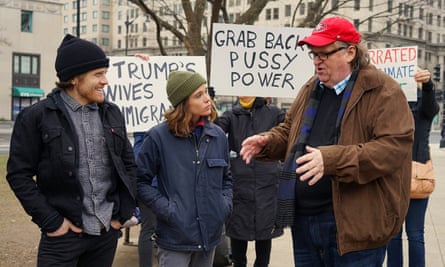
Page has been working since she was 10 and, in a certain light, she could still pass for a kid. In the show she’s promoting today, The Umbrella Academy, she plays the only non-powerful sibling in a dysfunctional family with superpowers and, even when in dialogue with a monkey butler (long story), she moves with the haunted delicacy of a child that’s seen too much.
How does her appearance affect the way she’s treated? “People are condescending. Though, it’s hard to know if it’s because I look young or because I’m a woman? It’s definitely affected how I’ve learned to express my opinion, though. I’ve become more direct in a way that’s really positive. It’s a lot to do with coming out, and the time spent figuring that out. I’m more… in my body?”
In 2017 she published a long post on Facebook about her experiences of harassment at work, including a story about one of Hollywood’s most successful directors Brett Ratner. It began: “‘You should fuck her to make her realise she’s gay.’ He said this about me during a cast and crew meet and greet before we began filming X-Men: The Last Stand. I was 18.” Writing this, she found her voice: “Ratner’s comment replayed in my mind many times over the years as I encountered homophobia and coped with feelings of reluctance and uncertainty about the industry and my future in it.
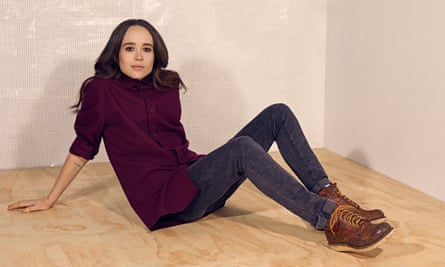
“Something had switched,” she remembers. “I wanted to talk about the shittiness I’d seen. I’ve dealt with these difficult things, whether it’s directors trying to sleep with me when I was 16, or stalkers. But there are people in society who deal with far, far worse and cannot access the resources I have.”
She does this often – catches herself in a moment of pity, and then quickly reminds herself of her immense privilege, something she wears heavily, like another shirt, a sort of feel-bad feminism that means even when she is describing something objectively terrible that happened to her, she must contextualise it within a continent of greater suffering. It seems exhausting. But perhaps necessary, for a person so aware of the internet’s reactions to an offhand quote and, perhaps, necessary for a person so aware of the platform she has.
“What changed for me after publishing that was the realisation how much crazy shit happened that was so normalised. And I internalised it. It’s disturbing. Then, talking about it does really open something in you, which is painful in many ways. But that’s what’s letting us all connect and have the conversations, about intersectional feminism, etc.”

Page is constantly working to educate herself, from reading Rebecca Solnit’s The Mother of All Questions (“Which is super”) to learning geography from an app. “I’m always learning, I’m always humble, but trying to be open and grow, and also to remind myself of the times when I didn’t know all this. In order to remember not to jump on people for getting stuff wrong, you know?”
Has she seen much change in the industry since sharing her #MeToo moment? She sucks up the last of her drink through a tiny straw. “After I wrote that, a producer sent me an email, like: ‘Oh, I had no idea!’ But that person had come to my trailer and told me I couldn’t talk to the director like that. I struggle with this industry because the changes don’t seem to be happening. When I was promoting Hard Candy [in 2005], I was asked the exact same questions I get asked today. ‘How do you play so many strong female roles?’ As if they would ever ask that to… I don’t know, James McAvoy!”
So if she doesn’t see change happening in the industry, why does she stay? “How can I hold two things in my head at the same time? Well, we’re all doing it, aren’t we? We’re at a place where we’ve been told the world as we know it will be gone by 2030, and we’re still all just checking our email. I love working with brilliant actors, so I’m making movies. But it’s a… strange time.”
One thing we need to do, she says, is change the language. “We need to stop claiming the political activists are ‘radical’. The people who are fucking radical are the people who want to keep destroying our water and our top soil and our air in order to give a few people billions more dollars.” They’re the extremists, she insists, not the people who want Americans to have universal health care. “It’s not a debate, whether Donald Trump is racist or not. Gay marriage is not a debate. And the media needs to stop claiming it is.”
What does she do about this, day to day? “We just have to try and educate ourselves. And really speak up. I’m learning to worry less about what people think, and not to be afraid to say the truth. Which is: ‘What’s happening right now is wrong.’” Those “feelings of reluctance” that she wrote about on Facebook, about her future in the industry, seem to have been resolved, not by quitting, but by refocusing her lens.
Here is the biggest public change since Page came out – the product of her acting is not the film, but instead the activism. The film is just the thing she does to make strangers listen. “Yes, but, I mean, I almost feel bad agreeing, because I think of the activists I’ve met who spend decades of their lives sacrificing so much in order to create substantial change. They’re the ones who should be listened to.” In her Facebook post about sexual abuse in Hollywood she listed people who had led the fight, including Marsha P Johnson and Audre Lorde. “If I can amplify their voices,” she says, “then that’s my aim.”
In Brazil, which has one of the highest murder rates of gay and transgender people in the world, Page coming out to the serial killer after enquiring after her safety caused him to pause, uncomfortable beneath his mask, before he walked out. She ended the episode explaining that, despite standing before a man who would prefer her dead, she left Brazil feeling inspired by a country where people live in such joyous celebration of who they are, especially in the face of such violence. “The spirit of love is what wins out in the end.”
She tells me she’s enjoying exploring New York, having spent the day walking with her wife, discussing the Mae Martin comedy special they’d watched the night before, how amazing it would have been to see something like that as a teenager, something so honest and funny about sexuality. “Oh yeah, we did well over 10,000 steps before lunch,” she says, unboasting. Then, suddenly, Portner is there and Page is grinning with a slow sort of relief, and they hold hands over the table, and she’s safe.
The Umbrella Academy launches on Netflix on 15 February
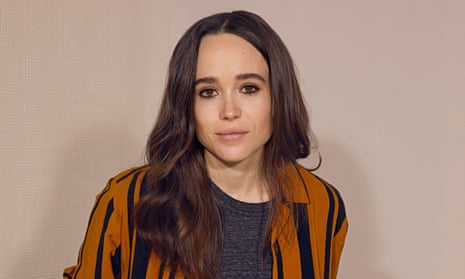
Comments (…)
Sign in or create your Guardian account to join the discussion